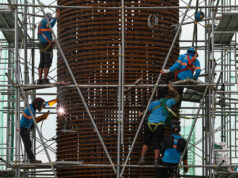Kaliwa Dam waiver, arbitration terms onerous, legislator says
A HOUSE official spelled out what he described as onerous provisions in the China-funded Kaliwa Dam project agreement, including the waiver of sovereign immunity and the conditions set for any arbitration proceeding.
Represenative Carlos Isagani T. Zarate, the Deputy Minority Leader from the Bayan Muna party list, said onerous nature of the provisions are “very apparent” and “cannot simply be ignored by Malacañang.”
The Palace had dismissed earlier claims of disadvantageous contract terms by saying that the deal could be subject to review if onerous provisions are found.
Mr. Zarate said the President’s Spokesman, Salvador S. Panelo, “should have done some research on these onerous provisions… especially after we exposed them early last year which also then prompted the Department of Finance (DoF) to make public the terms of the deal” Mr. Zarate said.
Mr. Zarate noted that under the terms of the Kaliwa Dam project agreement, the Philippines is not entitled to “any right of immunity on the grounds of sovereign or any legal process” and that the agreement “shall be governed by and construed in accordance with the laws of China”; and that the Hong Kong International Arbitration Centre will adjudicate on any disputes disputes. He also cited the confidentiality of the terms, conditions and the standard of fees of the loan agreement.
On Thursday, Mr. Panelo said in a briefing that Mr. Zarate had failed to identify any specific onerous provisions.
Mr. Zarate added that “solving the water crisis in Metro Manila can be done without building a large dam.”
“For starters, Manila Water and Maynilad should drastically reduce their system losses because billions of gallons of water are wasted daily from leakages in the existing distribution infrastructure,” Mr. Zarate said, referring to the two concession holders supplying water to Metro Manila, Manila Water, Co. Inc. and Maynilad Water Services Inc.
He said Maynilad wastes “more than a billion liters of water per day, while Manila Water, which has a much lower reported NRW (non-revenue water) than its west zone counterpart, suffers a deficit. This further underscores the inefficiency and wastefulness of water resource management and the artificiality of water shortage under MWSS privatization.”
He was referring to the Metropolitan Waterworks and Sewerage System (MWSS), the water industry’s regulator.
Mr. Zarate added that the combined water losses of both Manila Water and Maynilad are “too high at more than 28% of the estimated current water supply of 4,167 MLD (millions of liters per day)”.
“At any rate, just reducing the current total NRW (as estimated by MWSS) by half could produce an additional 588 MLD in water supply. This is almost the same yield as the P12.2 billion Chinese-funded Kaliwa dam that has a projected capacity of 600 MLD” Mr. Zarate noted.
“Malinaw na mukhang ginagamit lang ang sinasabing kakulangan sa tubig para ipilit ang Kaliwa dam at iba pang mga dam na gusto nilang mapondohan. Hindi nila sinasabi na ayusin lang nila ang mga sirang tubo ay mapipigilan ang sinasabi nilang krisis na hindi sisira ng kalikasan at magpapalayas ng mga katutubo (It is clear that the shortages are being used to force through the Kaliwa Dam and other projects that they want to fund. They are not looking into whether fixing the distribution system could avert a crisis without destroying the environment or expelling indigenous peoples),“ Mr. Zarate said. — Genshen L. Espedido



